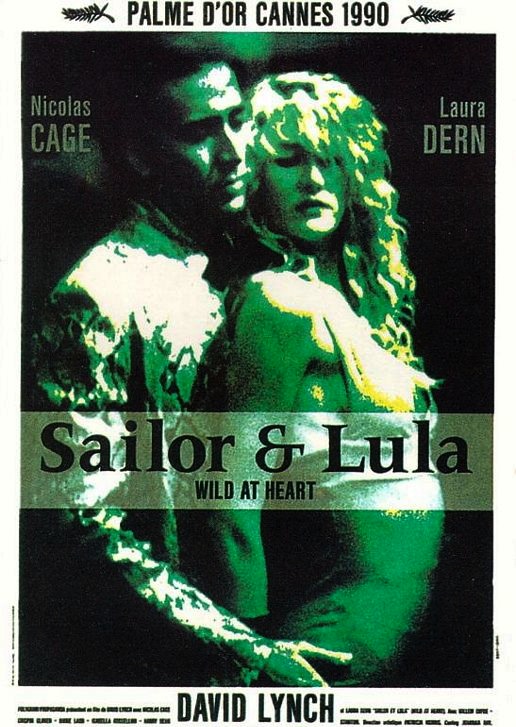Friday, August 31, 1990.
WILD AT HEART. Based on Barry Gifford's 1990 novel. Music by Angelo Badalamenti. Written and directed by David Lynch. Running time: 123 minutes. Restricted entertainment with the B.C. Classifier's warning: frequent nudity, suggestive scenes, very coarse language and some gory violence.
LULA LOVES SAILOR.
A 20-year-old Southern belle, Lula Fortune (Laura Dern) will defy her widowed mama and run off with her beau just as soon as he completes his 22 months and 18 days of penal servitude, his punishment for bashing out the brains of hit man Bob Ray Lemon (Gregg Dandridge) on the steps of the Cape Fear resort hotel ballroom.
"Maybe mama cares for me a little too much," she tells her Sailor, following a bout of illicit love-making.
Sailor loves Lula.
A 23-year-old rounder, Sailor Ripley (Nicolas Cage) is willing to risk the murderous wrath of her mother, mobster's mistress Marietta Fortune (Diane Ladd), break his parole and carry his beloved off to a new life in California.
"The whole world is Wild at Heart," Lula sighs during their flight through Texas. "And weird on top."
Strip away the weird and this is a movie about young lust complicated by excessive mother love. A tale of modern Southern decadence, it takes place down Sam Shepard-like side roads.
Weird, of course, is what makes it "a film by David Lynch." The Montana-born co-creator of television's Twin Peaks takes pride in being a one-man Fringe Festival.
His theatrical films, from Eraserhead (1978) to Blue Velvet (1986), have been genuinely bizarre. With Twin Peaks, Lynch won acclaim as a televisionary.
When our boy Davy became a broadcast phenomenon, the question was "can a cult director from the Midwest find happiness as a purveyor of mass market entertainment?"
The answer was "yes."
Now, of course, the question is "has success spoiled the laconic American auteur?"
Yup.
Lynch's Wild at Heart is commercial to the core, the work of a calculating iconoclast who has abandoned the cause of high weirdness for the safety of predictable Hollyweird.
His exhibits, a collection that includes a funny uncle, a crazy cousin, several cripples, killers and random kooks, are becoming tiresomely familiar. His brand of bland battiness is beginning to wear thin.
On this outing, he invents his own genre: the film moiré. Rather than risk confusing his legion of new fans, he waters down his film's inner dynamic, introducing unmistakable patterns so that his apparent purpose will be clear to all.
Look, we can whisper to one another, it's Lynch's own version of The Wizard of Oz. References to that most familiar of all films are sprinkled through his picture like breadcrumbs in Hansel and Gretel's forest.
Realizing the importance of satisfied customers, the wise entrepreneur makes his reputedly "difficult" vision so simple that even I could understand it.
I also understand the difference between innovation and exploitation. Despite a bright moment or two, Wild at Heart falls into the latter category, a picture that parcels out bits of explosive violence, sex and nudity, more to distinguish it from a telefilm than serve any artistic purpose.
Cage, whose last good movie was 1987's Raising Arizona, is just okay as the rebel-as-Elvis-clone, while Dern is utterly unexceptional in the wanna-be-a-bad-girl role.
The above is a restored version of a Province review by Michael Walsh originally published in 1990. For additional information on this archived material, please visit my FAQ.
Afterword: Nicolas Cage is the son of director Francis Ford Coppola's older brother August. A Beverly Hills High School graduate, it's been reported that Nicolas changed his last name to Cage to avoid the appearance of nepotism when he set out to become an actor. And it is true that Cage's first two feature film roles were in non-Coppola pictures: director Amy Heckerling's Fast Times at Ridgemont High (1982) and Martha Coolidge's Valley Girl (1983). It's also true that Uncle Francis cast his nephew in such Coppola features as Rumble Fish (1983), The Cotton Club (1984) and Peggy Sue Got Married (1986). A quirky presence who comes across as both solid and sincere, Cage quickly found work with such powerhouse directors as Alan Parker (Birdy; 1984); Norman Jewison (Moonstruck; 1987) and the Coen brothers (Raising Arizona; 1987).
Just over a decade into his screen acting career, he managed a best actor Academy Award win (for Mike Figgis's 1995 drama Leaving Las Vegas). With more than 70 feature film appearances to date, Cage has been eclectic — or, as some say, indiscriminate — in his choice of roles. Among his more memorable are Secret Service Agent Doug Chesnic, in director Hugh Wilson's Guarding Tess (1994), conspiracy theorist Ben Gates, in Jon Turteltaub's National Treasure series (2004, 2007, with another promised for 2016) and supernatural superhero Johnny Blaze in two Ghost Rider features (2007 and 2012). That Cage, a serious comic book fan, should play a Marvel Comics character is not surprising. That he should name his own son, born in 2005, Kal-El (the Superman character's "real" name), does seem extreme, though. In 2014, Cage played airline pilot Rayford Steele in a remake of the 2000 rapture fantasy Left Behind. Intended to "reboot" the fundamentalist Christian film franchise, the picture was a financial failure and the planned sequels have yet to go into production. Nicolas Cage, who continues to be in demand, turns 52 today (January 7, 2016).
See also: Among the films that continue to spark arguments among fans of director David Lynch are his 1984 adaptation of Frank Herbert's science fiction epic Dune. Then there is the endlessly fascinating Mulholland Dr., the 2001 puzzle picture written by Lynch himself.
